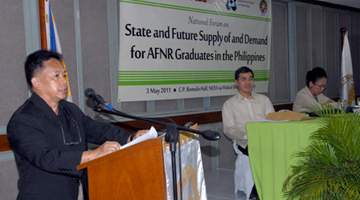 “Understanding the root cause of the problem on AFNR graduates supply and demand,” thus said PCARRD Executive Director Patricio S. Faylon, referring to the raison d’ être of the project on the supply and demand for agriculture, forestry and natural resources (AFNR) graduates in the Philippines, during a national forum on the project on May 3 at NEDA in Makati City.
“Understanding the root cause of the problem on AFNR graduates supply and demand,” thus said PCARRD Executive Director Patricio S. Faylon, referring to the raison d’ être of the project on the supply and demand for agriculture, forestry and natural resources (AFNR) graduates in the Philippines, during a national forum on the project on May 3 at NEDA in Makati City.
The project on the supply and demand for AFNR graduates in the Philippines is one of the components of the PCARRD-led “Program on enhancing the demand for AFNR graduates through S&T (science and technology)”.
The forum, hosted by the Philippine Institute for Development Studies (PIDS), was attended by the different contributors to the project from the Department of Science and Technology (DOST), Commission on Higher Education (CHED), Department of Labor and Employment (DOLE), Bureau of Local Employment, Department of Trade and Industry (DTI), Technical Education and Skills Development Authority (TESDA), state universities and colleges (SUCs), and AFNR Program’s regional teams and national coordinators.
Also, more than 30 institutions across 14 regions who implemented the projects and more than 100 higher education institutions (HEIs) attended the forum to update themselves of the project results and findings, which will be useful in drafting their respective plans and activities for the other components of the program.
Incidentally, PIDS, PCARRD, and the University of the Philippines, in consultation with the Philippine Association of State Universities and Colleges and CHED, conceptualized the policy research component of the program to identify the factors causing the downtrend of AFNR courses enrolment as well as the factors affecting the supply of and demand for AFNR graduates.
For more than a year, the team worked together to review literature; conduct human resource inventories; trace AFNR graduates; survey employers; analyze data; come up with supply and demand modeling; conduct projection and policy research by region; and integrate the results at the national level.
Moreover, the national program has supported a wide range of interventions to help HEIs across the country and improved the quality of AFNR degree offerings to increase enrolment. One notable feature of the program is its active promotion of S&T-based entrepreneurship development in the SUCs to provide AFNR students with a more balanced training and a viable alternative option to wage employment upon graduation.
Faylon lauded the efforts of the program team specifically for successfully gathering information to determine the state and predict the future supply of and demand for AFNR graduates in the country.
With the program nearing its completion, Faylon challenged the program and project implementers in using the findings of the projects to address unemployment and how increased enrolment in AFNR courses can help deal with the issue.
